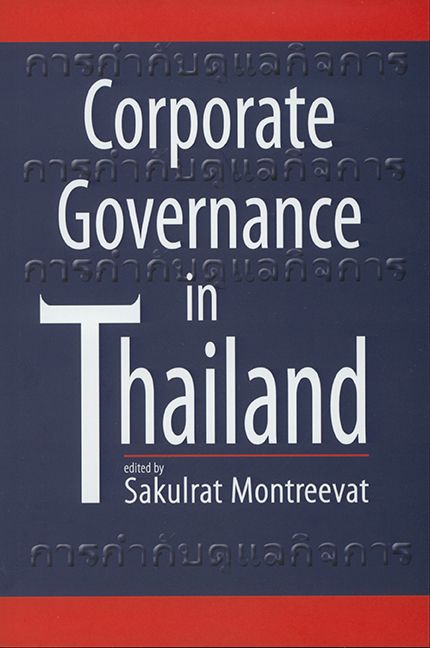Book contents
- Frontmatter
- Contents
- List of Tables
- List of Figures
- List of Abbreviations
- Acknowledgements
- Contributors
- Introduction
- 1 Transparency and Accountability of Listed Non-Financial Companies in Post-Crisis Thailand
- 2 Good Governance in the Thai Banking System
- 3 Corporate Governance among State-Owned Enterprises in Thailand
- 4 Thai Company Laws and Good Governance Practices of Unlisted Companies
- Concluding Remarks
- Index
Introduction
Published online by Cambridge University Press: 21 October 2015
- Frontmatter
- Contents
- List of Tables
- List of Figures
- List of Abbreviations
- Acknowledgements
- Contributors
- Introduction
- 1 Transparency and Accountability of Listed Non-Financial Companies in Post-Crisis Thailand
- 2 Good Governance in the Thai Banking System
- 3 Corporate Governance among State-Owned Enterprises in Thailand
- 4 Thai Company Laws and Good Governance Practices of Unlisted Companies
- Concluding Remarks
- Index
Summary
Objectives
In recent years there has been considerable interest in finding out whether good corporate governance is practised in Southeast Asia. Indeed, this area of research has been particularly important in the light of the 1997 financial crisis and the resultant slowdown in investment in the post-crisis period. Clearly, both events have served as a wake-up call for Southeast Asian economies, and forced policy-makers in the region to place more emphasis on capital market development as well as to improve corporate governance practices in the business sector.
Generally, corporate governance structures in Southeast Asia share similar characteristics such as a high ownership concentration, bank-centric financial systems, ineffective shareholders’ rights, and a low degree of transparency. In the pre-crisis period, the Thai economy relied heavily on bank lending as a source of funds. A majority of well-regarded analyses in the literature point out that what contributed to the depth of the 1997 financial crisis as well as the protracted period the Thai economy languished in the trough was the absence of a varied range of financing options as well as the poor corporate governance of Thai firms. Thailand then moved quickly to begin to develop its capital market. The outcome of this is that the reliance of firms on bank loans as their main source of funds has since been gradually diluted by the ongoing measures to develop the Thai capital market. In addition, the concept of corporate governance is being widely promoted; guidelines as to what constitutes good corporate governance are articulated and measures implemented to encourage and increase compliance. These bold initial steps have triggered an evolutionary process of further improvement and fine-tuning in Thailand'scorporate sector.
Based on such a background, this book explores how corporate governance is practised in four categories of corporate firms in Thailand: listed non-financial companies, commercial banks, state-owned enterprises, and unlisted companies. Its main objective is to shed light on the challenges confronting good corporate governance practices in each category of firms, as well as to provide some key policy recommendations to further raise the level of corporate governance already achieved.
- Type
- Chapter
- Information
- Corporate Governance in Thailand , pp. xv - xxiPublisher: ISEAS–Yusof Ishak InstitutePrint publication year: 2005

